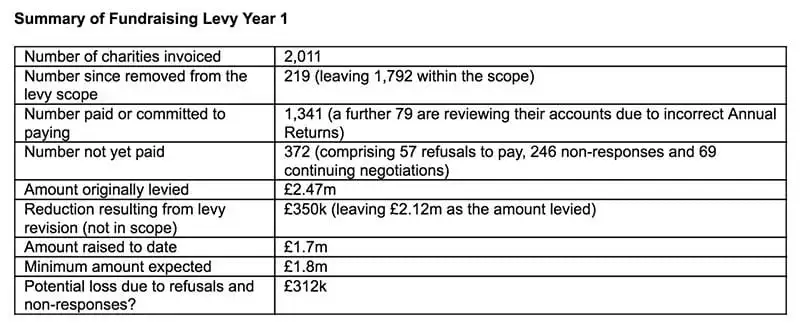Fundraising Regulator denies it is “running on reserves”
Stephen Dunmore, Chief Executive of the Fundraising Regulator, has rejected reports that the Regulator is “running on reserves” due to lack of support for the fundraising levy, describing it as “speculation”.
Civil Society Media yesterday reported that “Fundraising Regulator faces financial trouble as charities refuse to pay levy“, citing “a number of sources and documents”. It referred to the first round of the levy which is how the self-regulatory body is to be funded.
The Fundraising Regulator has asked all charities which spent £100,000 or more on fundraising activities in the 2014-15 financial year to pay a voluntary levy. The levy was instituted following consultation with the charity sector, and was a recommendation of the Cross-Party Review on Fundraising. It is, according to the Regulator, “designed to build public confidence in fundraising by ensuring that the country’s largest charitable fundraisers play a role in the regulation of their activities.”
Former Minister for Civil Society Rob expressed his disappointment at the report, reminding charities that statutory regulation could be imposed on the sector.
https://twitter.com/RobWilson_RDG/status/877513221871153152
Stephen Dunmore explained: “Our draft budget for the second year of operation is £1.8 million, revised downwards from £1.96m to reflect operational experience acquired during our first year of activity and our forecast of levy income. To date the levy has provided £1.7 million in year 1 (September 2017-August 2018) and we are confident that this will reach at least £1.8 million. The Board will take final decisions on our 2017/18 business plan and budget in July. ”
He shared a summary of the current state of the levy.
75% of eligible charities have paid
Charities have refused to pay for a variety of reasons. Some object to paying for the regulator from donations, some object to receiving an invoice for a voluntary payment, and others believe that the levy includes charities that are too small to afford such a fee.
Dunmore added that: “The majority of the UK’s largest fundraising charities and their membership bodies have supported the levy system and we appreciate their assistance. 75% of charities genuinely within the levy have paid, or are committed to paying, including all but a handful of the larger charities. That is good news.”
He pointed out that those charities that had not paid, in particular the smaller charities, “will in effect be subsidised by their peers”. The Fundraising Regulator would, he said, “continue to engage with charities who have not yet paid the levy”.
Public list of paying charities
One element of this “engagement” will be the publication, in the next few weeks, of a register of charities who have supported the levy.
Advertisement
Years two and three levies
Dunmore acknowledged that the first year of the levy had experienced problems, including calculations based on information provided to the Charity Commission by charities which “all too often… has proved to be inaccurate”.
He also stated that a review into the levy was underway, adding that this included “considering whether there might be advantages in moving to a statutory levy in year 3.”
The review is considering whether there might be advantages in moving to a statutory levy in year 3.
In refuting the claims, he reminded fundraisers and charity leaders that “ministers hold reserve powers to impose both fundraising regulation and the levy on a statutory basis.”
- Fundraising Regulator informs charities of its upcoming levy (5 October 2016)
- Fundraising Regulator publishes proposals on its levy registration fees (26 June 2016)
- The Fundraising Regulator: one year on (20 June 2017)




